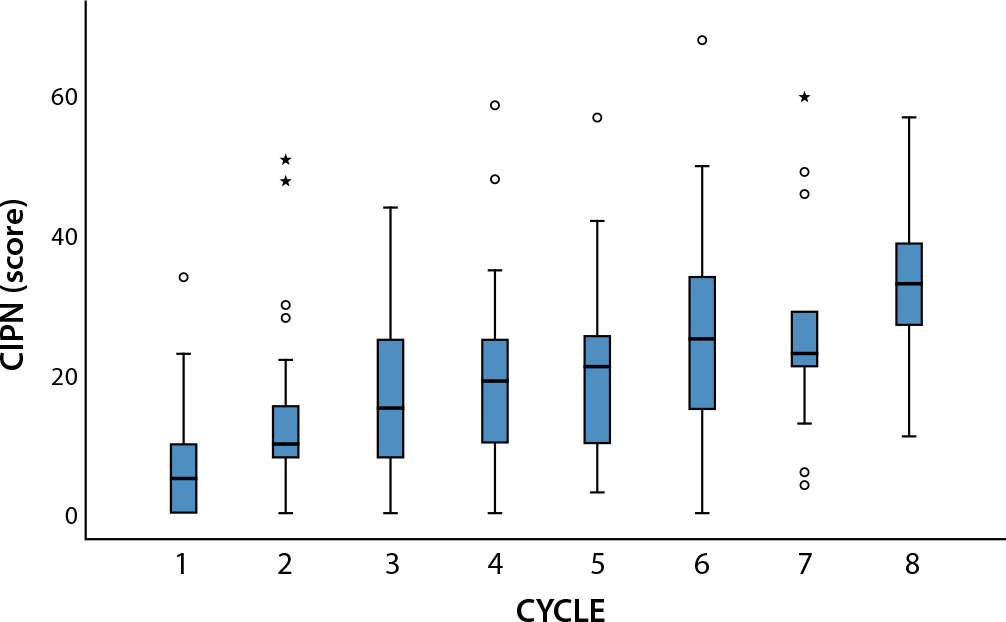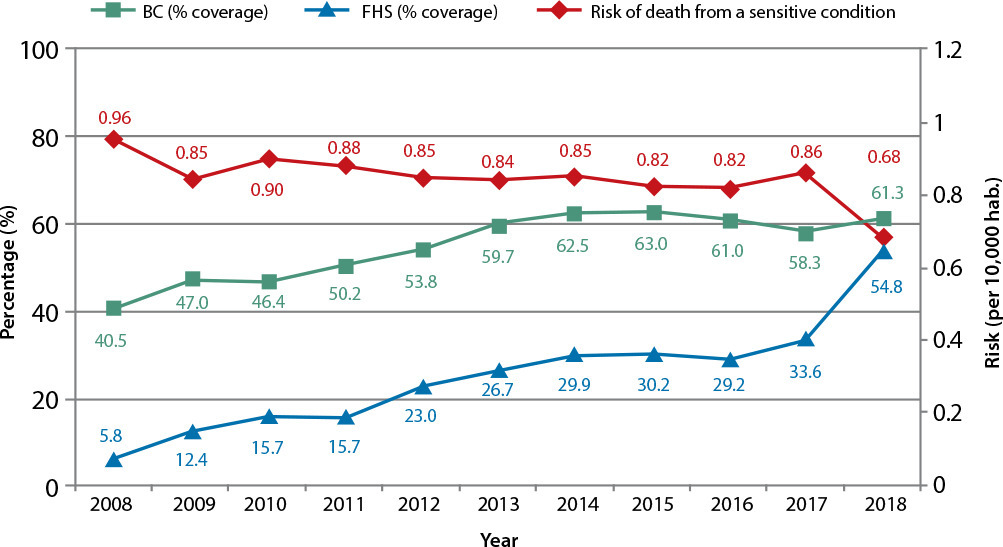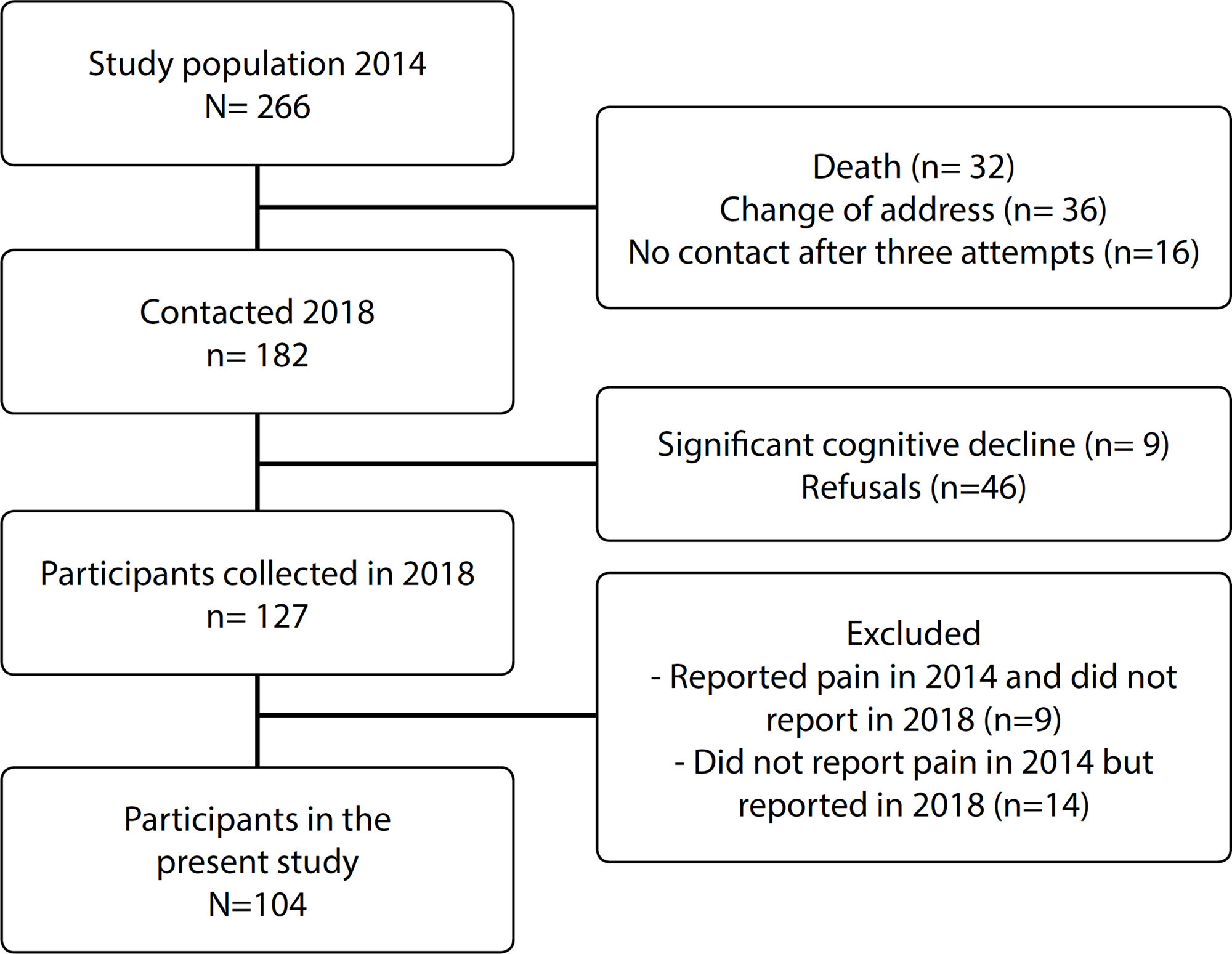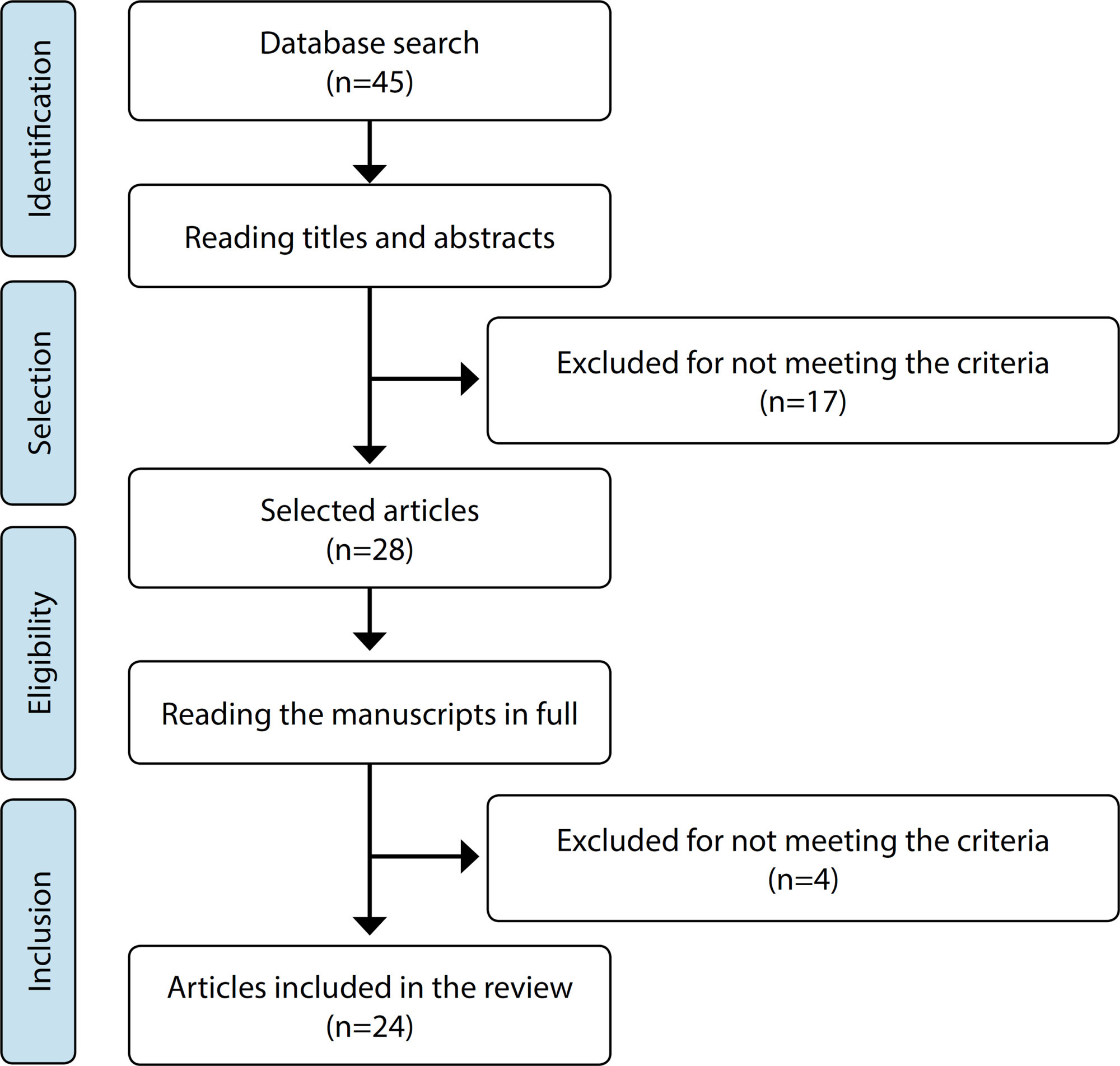-
01-01-2015
Quality of life and physical activity in intensive care professionals from middle São Francisco
Revista Brasileira de Enfermagem. 2015;68(1):26-31
Abstract
Quality of life and physical activity in intensive care professionals from middle São Francisco
Revista Brasileira de Enfermagem. 2015;68(1):26-31
DOI 10.1590/0034-7167.2015680104i
Views0See moreObjective:
the objective was to assess the level of physical activity (LPA) and the quality of life QL of the professionals who work in ICU.
Method:
this was a cross-sectional study carried out in Adult ICUs. LPA was assessed by the International Questionnarie of Physical Activity – short form (IQPA-SF) and the QL by the Medical Outcomes Study 36 (SF-36) questionnaire.
Results:
it was classified active 50.89% out of a total of 59 professionals. Nursing technicians were considered the most active with 60.6%. The QL of the professionals who were considered active were better when compared to inactives, with statistical differences to the category of physical aspects limitation, social aspects and mental health. The working hours were higher than recommend, the physicians were higher than the physical therapist, nurses and technicians nurses (p = 0.046).
Conclusion:
physically active professionals who work in ICU had higher quality of life probably why have lower hours of work and consequently more free time to engage in physical activity.

-
01-01-2015
Learning needs of Nursing students in technical vocational education
Revista Brasileira de Enfermagem. 2015;68(1):20-25
Abstract
Learning needs of Nursing students in technical vocational education
Revista Brasileira de Enfermagem. 2015;68(1):20-25
DOI 10.1590/0034-7167.2015680103i
Views0See moreObjective:
identify learning needs of students of Technical Vocational Education (TVE) in Nursing. Qualitative study conducted in a city of São Paulo state.
Method:
the subjects were students, teachers and coordinators of TVE and students of the bachelor degree who have had contact with TVE. Data collection was performed by questionnaire socioeconomic and cultural circles about the learning needs. For data analysis we used the content analysis.
Results:
it was found that students have difficulties contents not related to nursing as portuguese and mathematics, as well as introductory courses in the course of TVE which possibly may interfere negatively in learning specific content of nursing and the quality of health care.
Conclusion:
it is necessary to rethink the content taught and ways to teach from basic education, as well as the training of teachers who now works in the TVE.
-
01-01-2015
Serious game e-Baby: nursing students’ perception on learning about preterm newborn clinical assessment
Revista Brasileira de Enfermagem. 2015;68(1):13-19
Abstract
Serious game e-Baby: nursing students’ perception on learning about preterm newborn clinical assessment
Revista Brasileira de Enfermagem. 2015;68(1):13-19
DOI 10.1590/0034-7167.2015680102i
Views0See moreObjective:
to evaluate students opinion regarding e-Baby educational technology.
Methodology:
exploratory descriptive study in which participated a sample composed of 14 nursing Portuguese students that used e-Baby digital educational technology in an extracurricular course. To achieve the aim of the study, the data collection was realized through an opinion instrument in Likert scale including the possibility of commentaries by students. Is was also collected data of participants’ characterization.
Results:
students made very satisfactory evaluations regarding the game e-Baby, varying since usability acceptation through suggestions of expansion of the game to other nursing themes.
Conclusion:
serious game e-Baby can be considered a didactic innovation and motivator tool of learning. Besides, it demonstrates have adequate interface in design and educative function aspects, evocating intense interaction between user and computational tool.

-
01-01-2015
Challenges beyond the scientific knowledge production
Revista Brasileira de Enfermagem. 2015;68(1):7-8
Abstract
Challenges beyond the scientific knowledge production
Revista Brasileira de Enfermagem. 2015;68(1):7-8
DOI 10.1590/0034-7167.2015680101p
Views0For several decades, innumerous appeals and reflections on how to build the nursing science and achieve visibility in the scientific world led researchers to make efforts to produce knowledge that contributed to the well-being of people, improving their quality of life, relieving their suffering and transforming the reality in which we live. In addition to […]See more
-
ORIGINAL ARTICLE01-30-2023
Adverse dermatoneurological events and impacts on daily activities of patients with gastrointestinal neoplasms undergoing chemotherapy
Revista Brasileira de Enfermagem. 2023;76(1):e20220161
Abstract
ORIGINAL ARTICLEAdverse dermatoneurological events and impacts on daily activities of patients with gastrointestinal neoplasms undergoing chemotherapy
Revista Brasileira de Enfermagem. 2023;76(1):e20220161
DOI 10.1590/0034-7167-2022-0161
Views0See moreABSTRACT
Objective:
to associate the presence and grading of adverse dermatoneurological events (peripheral neuropathy and hand-foot syndrome) and the interference in the activities of daily living of patients with gastrointestinal neoplasms undergoing systemic antineoplastic treatment.
Method:
this is a longitudinal, prospective study, using instruments to assess hand-foot syndrome and peripheral neuropathy.
Results:
there were 36 patients: 66.7% diagnosed with colon cancer and 83.2% on combination therapy. From cycle 5 onwards, all of them had hand-foot syndrome, with a majority of grade 1, unrelated to interference in activities of daily living. Regarding peripheral neuropathy, there was a moderate to strong correlation from cycle 1 of treatment.
Conclusion:
peripheral neuropathy negatively affects activities of daily living. The monitoring of dermatoneurological events by oncology nurses contributes to the clinical practice of nursing and subsidizes the development of advanced practice in the country.

-
ORIGINAL ARTICLE12-16-2023
Elderly Mortality due to Ambulatory Care Sensitive Conditions and Primary Health Care Coverage in the Federal District
Revista Brasileira de Enfermagem. 2023;76(1):e20220170
Abstract
ORIGINAL ARTICLEElderly Mortality due to Ambulatory Care Sensitive Conditions and Primary Health Care Coverage in the Federal District
Revista Brasileira de Enfermagem. 2023;76(1):e20220170
DOI 10.1590/0034-7167-2022-0170
Views0See moreABSTRACT
Objectives:
To describe the mortality coefficients of elderly due to primary care sensitive conditions, from 2008 to 2018, and determine its association with the coverage of the Primary Health Care (Family Health Strategy and Basic Care models) in the Federal District.
Methods:
Ecological time series of mortality in Federal District elderly, from 2008 to 2018. The Poisson regression model was applied, considering as significant those with p<0.05, with a CI of 95%.
Results:
There were 70,503 deaths. There was a decrease in the risk of death of elders due to cardiovascular diseases and diabetes. Higher primary care coverage decreased the chance of death by sensitive conditions, both in Basic Care (OR: 0.994, CI: 0.990-0.998) and in the Family Health Strategy (OR: 0.997, CI: 0.995-0.999).
Conclusions:
Primary Care coverage was associated with a lower chance of death of the elderly due to Ambulatory Care Sensitive Conditions, especially in Basic Care.

-
ORIGINAL ARTICLE11-28-2023
Syphilis in pregnancy and congenital syphilis: women’s experiences from the perspective of symbolic interactionism
Revista Brasileira de Enfermagem. 2023;76(1):e20220210
Abstract
ORIGINAL ARTICLESyphilis in pregnancy and congenital syphilis: women’s experiences from the perspective of symbolic interactionism
Revista Brasileira de Enfermagem. 2023;76(1):e20220210
DOI 10.1590/0034-7167-2022-0210
Views1See moreABSTRACT
Objectives:
to understand the meanings attributed by women to the diagnosis and treatment of syphilis and congenital syphilis, and to outpatient follow-up of their children.
Methods:
this is a qualitative study conducted with 30 mothers of children with congenital syphilis using audio-recorded semi-structured interviews, which were submitted to inductive thematic analysis. Symbolic interactionism was the theoretical framework considered in this study.
Results:
two themes were identified, showing the maternal diagnosis involved shock, guilt, and fear of social exclusion, in addition to frustration due to failure to prevent vertical transmission. Moreover, the painful clinical procedures for the child’s treatment enhanced maternal guilt, and the symbolic process of re-signification of the disease/treatment took place with the child’s healing.
Final Considerations:
understanding the intersubjective aspects involved in this experience helps nurses rethink their care practice and contributes to their critical role in the context of syphilis.
-
ORIGINAL ARTICLE11-28-2023
Brazilian undergraduate nursing students’ critical thinking need to be increased: a cross-sectional study
Revista Brasileira de Enfermagem. 2023;76(1):e20220315
Abstract
ORIGINAL ARTICLEBrazilian undergraduate nursing students’ critical thinking need to be increased: a cross-sectional study
Revista Brasileira de Enfermagem. 2023;76(1):e20220315
DOI 10.1590/0034-7167-2022-0315
Views0See moreABSTRACT
Objectives:
to map Brazilian undergraduate nursing students’ critical thinking level and investigate the correlation between selected sociodemographic data and critical thinking domains.
Methods:
in this descriptive cross-sectional study, participants’ (N=89) critical thinking was assessed using the Health Science Reasoning Test. Correlation between critical thinking domains and sociodemographic data was assessed using the Pearson correlation coefficient.
Results:
the overall results showed a moderate level of participants’ critical thinking (mean = 70.7; standard deviation 5.7). A poor performance was identified in 5 of the 8 critical thinking domains. A significant positive correlation was found between education period and critical thinking (p<.001).
Conclusions:
poor level in students critical thinking domains may lead to negative consequences for their learning outcomes. Further studies should be carried out to confirm our results, in addition to investigation of teaching methods that encourage and ensure the development of students’ critical thinking skills during nursing education.
-
ORIGINAL ARTICLE02-06-2023
Teaching entrepreneurship in undergraduate Nursing course: evaluation of an educational proposal
Revista Brasileira de Enfermagem. 2023;76(2):e20210244
Abstract
ORIGINAL ARTICLETeaching entrepreneurship in undergraduate Nursing course: evaluation of an educational proposal
Revista Brasileira de Enfermagem. 2023;76(2):e20210244
DOI 10.1590/0034-7167-2021-0244
Views1See moreABSTRACT
Objective:
To evaluate a proposal for teaching entrepreneurship in an undergraduate Nursing course that uses active methodologies and activities based on the theory of meaningful learning.
Methods:
Interventional, prospective study, with a quantitative perspective, with a total of 102 participating students, carried out from July 2017 to December 2019 at a public university in the state of Sao Paulo. Statistical analysis were performed by non-parametric Chi-square or Fisher’s exact tests, with differences considered statistically significant if p < 0.05.
Results:
Improvements were observed in almost all items evaluated, revealing that meaningful learning became more effective with the use of active teaching methodologies. Most students need adaptation and effort to be put into these methods.
Conclusions:
The proposal offers pedagogical content adaptation, specifically for nursing students. New research should expand teaching-learning techniques for the development of future nurses, preparing them adequately for the job market.

-
ORIGINAL ARTICLE03-06-2023
Medication reconciliation in pediatrics: a validation of instruments to prevent medication errors
Revista Brasileira de Enfermagem. 2023;76(2):e20210755
Abstract
ORIGINAL ARTICLEMedication reconciliation in pediatrics: a validation of instruments to prevent medication errors
Revista Brasileira de Enfermagem. 2023;76(2):e20210755
DOI 10.1590/0034-7167-2021-0755
Views0See moreABSTRACT
Objectives:
to develop and validate the content of two instruments for promoting medication reconciliation for the transition of care of hospitalized children.
Methods:
methodological study, conducted in five stages: scope review for conceptual structure; elaboration of the initial version; content validation with five specialists using the Delphi technique; reassessment; and construction of the final version of the instruments. A content validity index of at least 0.80 was adopted.
Results:
three rounds of evaluation were carried out to reach the validity index of the proposed contents, whereas a new analysis of 50% of the 20 items of the instrument aimed at families, and 28.5% of the 21 items aimed at professionals was necessary. The instrument aimed at families reached an index of 0.93, and the instrument for professionals, 0.90.
Conclusions:
the proposed instruments were validated. It is now possible to proceed with practical implementation studies to identify their influence on safety during medication reconciliation at transition of care.

-
ORIGINAL ARTICLE05-08-2023
Precarious work at a surgical center: implications for the organization and for the health of nursing workers
Revista Brasileira de Enfermagem. 2023;76(2):e20220120
Abstract
ORIGINAL ARTICLEPrecarious work at a surgical center: implications for the organization and for the health of nursing workers
Revista Brasileira de Enfermagem. 2023;76(2):e20220120
DOI 10.1590/0034-7167-2022-0120
Views0See moreABSTRACT
Objectives:
to analyze the implications of precarious work for the organization of work and for the health of nursing professionals in a surgical center.
Methods:
qualitative, descriptive study in which the interview technique was applied on 30 nursing professionals from a surgical center in a university hospital located in the Southeast region of Brazil. The project was approved by the research ethics committee. Thematic content analysis was applied in the categorization of speeches.
Results:
precarious work in the surgical center negatively affects the organization of work due to staff turnover, loss of skilled talent, and the need for continuous training of temporary workers. It also affects the quality of care, leading to risks to patient safety and workers’ health.Final Considerations: it is important to make work conditions less precarious in order to minimize staff turnover and promote the quality of the service offered and the health of the worker.
-
ORIGINAL ARTICLE04-07-2023
Suicide attempts by adolescents assisted in an emergency department: a cross-sectional study
Revista Brasileira de Enfermagem. 2023;76(2):e20220137
Abstract
ORIGINAL ARTICLESuicide attempts by adolescents assisted in an emergency department: a cross-sectional study
Revista Brasileira de Enfermagem. 2023;76(2):e20220137
DOI 10.1590/0034-7167-2022-0137
Views1See moreABSTRACT
Objectives:
to identify and characterize the care provided to adolescents admitted to an emergency department due to a suicide attempt.
Methods:
an observational, cross-sectional, descriptive study with a retrospective approach, carried out with medical records of adolescents aged 10 to 19 admitted for suicide attempts, between January 2015 and July 2020, in an emergency department. Data were subjected to descriptive and inferential analysis.
Results:
eighty-eight service occurrences were identified, mainly to females, exposed to multiple risk factors. Exogenous intoxication was the main method used, occurring at home and on weekdays. There were systemic repercussions, requiring multiple interventions and hospitalizations. Only 26% of cases were notified.
Conclusions:
adolescents treated for suicide attempts were exposed to multiple risk factors, with intoxication as the main means used. There is concern about the underreporting of cases and the logic of clinical care and medicalization.
-
02-08-2021
Elder abuse: actions and suggestions by Primary Health Care professionals
Revista Brasileira de Enfermagem. 2021;74:e20200263
Abstract
Elder abuse: actions and suggestions by Primary Health Care professionals
Revista Brasileira de Enfermagem. 2021;74:e20200263
DOI 10.1590/0034-7167-2020-0263
Views0See moreABSTRACT
Objective:
to analyze the actions and suggestions of Primary Care professionals in relation to elder abuse.
Method:
this is a research with a qualitative approach based on the realization of focus groups with professionals from Primary Health Care in a city in the interior of São Paulo. The methodological stance of Hermeneutic-Dialectic thinking (HD) was adopted.
Results:
two themes were listed: Actions taken by health professionals and Suggestions for improving care for elderly victims of violence.
Final considerations:
professionals emphasized the need to implement new resources and improve the functioning of existing ones, so that comprehensive care is possible, in order to prevent and intervene in the important social and public health problem that violence represents.
-
05-21-2021
Influence of chronic pain on cognitive performance in elderly caregivers: a longitudinal study
Revista Brasileira de Enfermagem. 2021;74:e20200412
Abstract
Influence of chronic pain on cognitive performance in elderly caregivers: a longitudinal study
Revista Brasileira de Enfermagem. 2021;74:e20200412
DOI 10.1590/0034-7167-2020-0412
Views0See moreABSTRACT
Objective:
to compare cognitive performance of elderly caregivers with and without chronic pain over four years and verify the effect of pain intensity on cognitive performance of elderly caregivers with chronic pain.
Method:
a longitudinal study with data collected in 2014 and 2018. Community-dwelling elderly caregivers of a Brazilian city participated in the study. Cognition was assessed using the Addenbrooke’s Cognitive Examination instrument. Pain was assessed by an 11-point scale. For data analysis, a mixed linear model and ANCOVA with a 5% significance level were used.
Results:
they were divided into two groups. A cognitive decline over four years was found in elderly people with pain (p=0.02; 95%CI=0.32-4.25), while those without pain did not show a significant change.
Conclusion:
the results show that elderly caregivers with pain had a worse cognitive performance, but when comparing groups with the ANCOVA test for intergroup analysis, there was no difference in cognitive performance.

-
ORIGINAL ARTICLE12-21-2020
Comprehensive care from the perspective of nurses: an ecosystem approach
Revista Brasileira de Enfermagem. 2020;73:e20190781
Abstract
ORIGINAL ARTICLEComprehensive care from the perspective of nurses: an ecosystem approach
Revista Brasileira de Enfermagem. 2020;73:e20190781
DOI 10.1590/0034-7167-2019-0781
Views1See moreABSTRACT
Objectives:
to verify nurses’ perceptions about comprehensive care to human beings from the ecosystem perspective, with Therapeutic Touch use.
Methods:
an exploratory-descriptive, qualitative study, conducted with 11 nurses who use/used Therapeutic Touch in daily work. Data were collected through online semi-structured interviews and submitted to discursive textual analysis. The ecosystem framework was used.
Results:
participants talked about the theme in a polysemic way, but understand that comprehensive care is associated with nursing professionals and intrinsic in their being and doing, considering the philosophical theoretical bases of nursing, which aim at the comprehensiveness of being.
Final Considerations:
Therapeutic Touch was considered as a way to achieve comprehensive care caring to human being ins. The objective of the study was achieved; however, it is understood the need for other research to advance this knowledge and enable innovations in professional practice of nurses.
-
02-12-2021
(Lack of) oral hygiene care for hospitalized elderly patients
Revista Brasileira de Enfermagem. 2021;74:e20200415
Abstract
(Lack of) oral hygiene care for hospitalized elderly patients
Revista Brasileira de Enfermagem. 2021;74:e20200415
DOI 10.1590/0034-7167-2020-0415
Views0See moreABSTRACT
Objective:
to analyze the oral hygiene care for hospitalized elderly patients provided by the nursing staff.
Method:
this is a qualitative, exploratory-descriptive study carried out in a university hospital, with the participation of 35 professionals from the nursing staff. Data collection was carried out through semi-structured interviews, explored through thematic content analysis.
Results:
two categories emerged: The oral hygiene of hospitalized elderly patients as an extension of body care and Barriers in (lack of) care with the oral hygiene of hospitalized elderly patients, with two subcategories: The oral hygiene and dental prosthesis technique performed divergently; Care hampered by deficit of materials and human resources.
Final considerations:
this study showed weaknesses in the oral hygiene care of hospitalized elderly patients, promoting reflections on the practice informed in data and management actions, allowing recommendations of care standards for the nursing staff.
-
ORIGINAL ARTICLE12-21-2020
Terms of specialized nursing language for chronic renal patients undergoing conservative treatment
Revista Brasileira de Enfermagem. 2020;73:e20190820
Abstract
ORIGINAL ARTICLETerms of specialized nursing language for chronic renal patients undergoing conservative treatment
Revista Brasileira de Enfermagem. 2020;73:e20190820
DOI 10.1590/0034-7167-2019-0820
Views0See moreABSTRACT
Objectives:
to validate the terms of the specialized nursing language used in the care of people with chronic kidney disease undergoing conservative treatment identified in the literature by mapping them with terms of the International Classification for Nursing Practice, version 2019, and representing them by means of a mandala.
Methods:
descriptive, documentary and methodological study. The terms were collected in 53 scientific articles, standardized and mapped with the terminology. The validation was performed by six nurses through a focus group. The Content Validity Index was used and terms with a value ≥ 0.80 were validated.
Results:
the normalization resulted in 957 relevant terms, of which 499 were constant and 458 not included in the terminology. Terms were validated when Content Validity Index was between 0.86 and 1.0.
Conclusions:
the study allowed the validation of terms that will contribute to unify the professional language of nursing in the care of people with chronic kidney disease.

-
05-21-2021
Factors associated with quality of life of older adults with chronic pain
Revista Brasileira de Enfermagem. 2021;74:e20200554
Abstract
Factors associated with quality of life of older adults with chronic pain
Revista Brasileira de Enfermagem. 2021;74:e20200554
DOI 10.1590/0034-7167-2020-0554
Views0See moreABSTRACT
Objective:
To analyze the factors associated with quality of life of the older adults with chronic pain.
Method:
Cross-sectional study conducted with 239 older adults in outpatient care in the state of Goiás, Brazil. The World Health Organization Quality of Life–Old (WHOQOL-OLD) instrument contains six domains and was applied to assess quality of life. Simple and multiple linear regressions were used in the statistical analysis.
Results:
The factors associated with Sensory Abilities were age (β = – 0.52), time spent together (β = – 14.35; – 17.86; – 15.57), and pain intensity (β = – 1, 70). Autonomy was associated with depression (β = – 5.99) and chest pain (β = – 6.17). Social participation related to schooling (β = – 0.64), diabetes mellitus (β = – 8.15), depression (β = – 14.53), pain intensity (β = – 1.43), and lower limb pain (β = – 5.94). Past, present and future activities related to depression (β = – 6.94). Death and dying related to hypertension (β = – 8.40), while Intimacy to depression (β = – 5.99) and headache/face pain (β = – 3.19).
Conclusion:
The time experiencing chronic pain and the location of this experience, as well as depression, diabetes and systemic arterial hypertension were factors that had greater influence on the older adult’s Quality of Life domains.
-
REVIEW09-06-2022
Religiosity and mental health as aspects of comprehensiveness in care
Revista Brasileira de Enfermagem. 2022;75(1):e20201011
Abstract
REVIEWReligiosity and mental health as aspects of comprehensiveness in care
Revista Brasileira de Enfermagem. 2022;75(1):e20201011
DOI 10.1590/0034-7167-2020-1011
Views0See moreABSTRACT
Objective:
to understand how religiosity can influence the health of individuals diagnosed with mental disorders, based on comprehensive care.
Methods:
this is an integrative literature review, with the inclusion of articles in Portuguese, English and Spanish, between 2010 and 2018.
Results:
the critical analysis and qualitative synthesis of the 24 selected studies were categorized into two subtopics: The influence of religiosity in promoting comprehensive mental health care; Mental health versus religiosity: influencing conditions for effective access to comprehensive care.
Final considerations:
a positive influence of religiosity was identified in the lives of individuals diagnosed with mental disorders; however, evidence shows that health teams do not feel comfortable and prepared to work with religiosity as an expression of spirituality. This being one of the dimensional aspects of health, it can be inferred, on the results, the existence of this gap in the comprehensive care approach.

-
ORIGINAL ARTICLE05-03-2021
Implementation of a surgical safety checklist in Brazil: cross-sectional study
Revista Brasileira de Enfermagem. 2021;74(2):e20190874
Abstract
ORIGINAL ARTICLEImplementation of a surgical safety checklist in Brazil: cross-sectional study
Revista Brasileira de Enfermagem. 2021;74(2):e20190874
DOI 10.1590/0034-7167-2019-0874
Views0See moreABSTRACT
Objective:
to identify the implementation process of the World Health Organization Surgical Safety Checklist in Brazilian hospitals.
Methods:
this is a cross-sectional study with 531 participants during a Congress of Perioperative Nursing, promoted by the Brazilian Association of Operating Room Nurses, Anesthetic Recovery and Material and Sterilization Center, in 2017.
Results:
among the nursing professionals included, 84.27% reported the checklist implementation in the workplace. Regarding daily application in the Sign-in stage, 79.65% of professionals confirmed patient identification with two indicators; in the Time-out stage, 51.36% of surgeries started regardless of confirmation of one of the items. In the Sign-out stage, 69.34% of professionals did not count or occasionally counted the surgical instruments and suture needles, and only 36.36% reviewed concerns about postoperative recovery.
Conclusion:
this study identified needs for improvements in applying the checklist in the Brazilian reality, to guarantee safer surgical procedures.
Search
Search in:
Nuvem de Tags
Adolescente (85) Atenção Primária à Saúde (239) COVID-19 (91) Criança (91) Cuidados de Enfermagem (269) Educação em Enfermagem (151) Educação em Saúde (139) Enfermagem (930) Enfermagem Pediátrica (86) Estudantes de Enfermagem (77) Estudos de Validação (131) Família (87) Idoso (208) Promoção da Saúde (99) Qualidade de Vida (104) Saúde do Trabalhador (86) Saúde Mental (145) Saúde Pública (82) Segurança do Paciente (150) Tecnologia Educacional (100)



